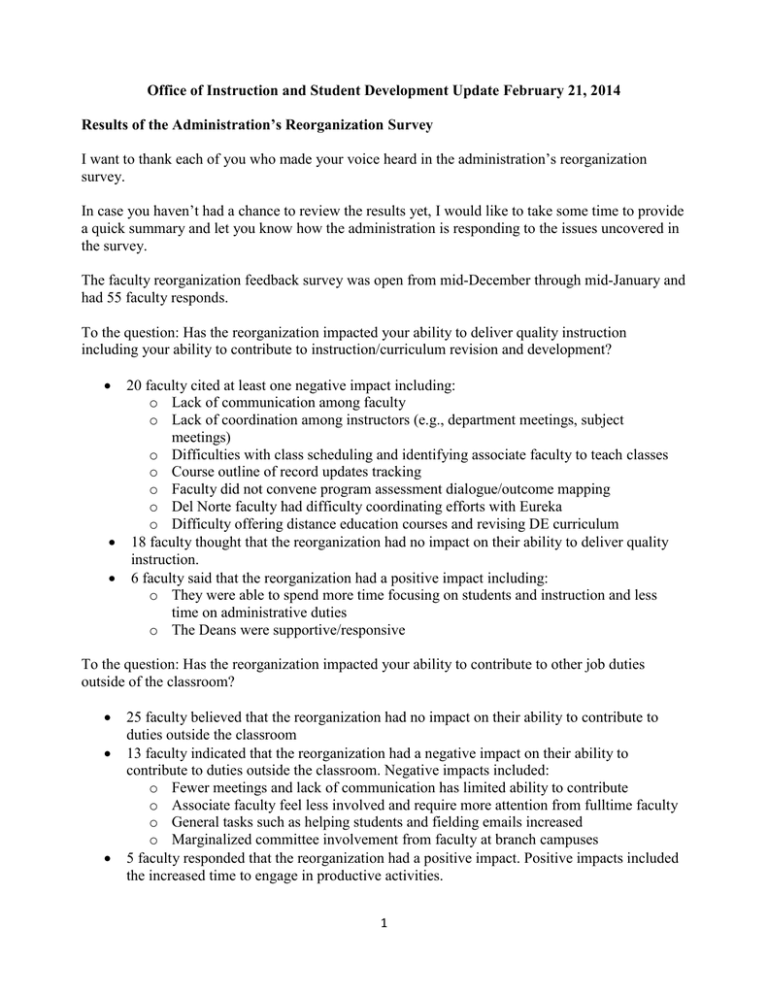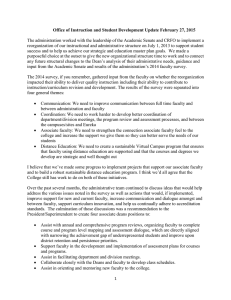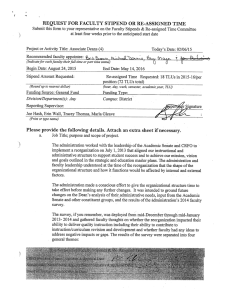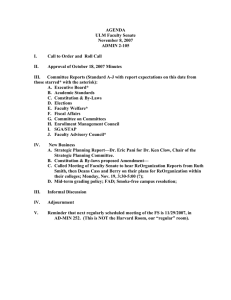Office of Instruction and Student Development Update February 21, 2014
advertisement

Office of Instruction and Student Development Update February 21, 2014 Results of the Administration’s Reorganization Survey I want to thank each of you who made your voice heard in the administration’s reorganization survey. In case you haven’t had a chance to review the results yet, I would like to take some time to provide a quick summary and let you know how the administration is responding to the issues uncovered in the survey. The faculty reorganization feedback survey was open from mid-December through mid-January and had 55 faculty responds. To the question: Has the reorganization impacted your ability to deliver quality instruction including your ability to contribute to instruction/curriculum revision and development? 20 faculty cited at least one negative impact including: o Lack of communication among faculty o Lack of coordination among instructors (e.g., department meetings, subject meetings) o Difficulties with class scheduling and identifying associate faculty to teach classes o Course outline of record updates tracking o Faculty did not convene program assessment dialogue/outcome mapping o Del Norte faculty had difficulty coordinating efforts with Eureka o Difficulty offering distance education courses and revising DE curriculum 18 faculty thought that the reorganization had no impact on their ability to deliver quality instruction. 6 faculty said that the reorganization had a positive impact including: o They were able to spend more time focusing on students and instruction and less time on administrative duties o The Deans were supportive/responsive To the question: Has the reorganization impacted your ability to contribute to other job duties outside of the classroom? 25 faculty believed that the reorganization had no impact on their ability to contribute to duties outside the classroom 13 faculty indicated that the reorganization had a negative impact on their ability to contribute to duties outside the classroom. Negative impacts included: o Fewer meetings and lack of communication has limited ability to contribute o Associate faculty feel less involved and require more attention from fulltime faculty o General tasks such as helping students and fielding emails increased o Marginalized committee involvement from faculty at branch campuses 5 faculty responded that the reorganization had a positive impact. Positive impacts included the increased time to engage in productive activities. 1 To the question: If the reorganization has had a negative impact/resulted in gaps, do you have any ideas about what can be done to help? 34 faculty reported at least one negative impact/gap as a result of the reorganization. Gaps included: o Lack of point person / coordination of department activities (e.g., department meetings) o Lack of communication either among faculty groups, or among administration and faculty o Lack of coordination of assessment activity, especially program-level assessment o Weakened support staff to support faculty and students o Difficulty teaching distance education courses/revising DE curriculum 7 faculty reported that they did not experience negative impacts/gaps. Some suggestions faculty noted as additional opportunities for developing more efficient functions, structures or processes included: Provide area coordination for the larger disciplines beyond what can be provided by the Deans or identify a designated liaison to handle communication from faculty to Dean Allow faculty to lead assessment, not the Deans. Move scheduling to staff Put in place a year-long academic calendar with all deadlines for faculty. Implement more video conferencing Have students sign a single form when they are new to CR exonerating CR from liability in labs, field trips, etc. Encourage collaboration and teamwork, and use technology to increase efficiency Set more tangible goals so that everyone knows what is required of them Keep things stable so we can continue to get used to them The staff reorganization feedback survey was open from mid-December through mid-January Thirty-eight staff responded to the reorganization survey. 33 were from Eureka and 5 from Del Norte. Staff responses to the open ended question “Has the reorganization impacted your ability to perform your job duties?” included: 18 staff indicated that the reorganization had a negative impact. The most common issue cited (by 10 respondents) was an increase in work responsibilities, sometimes without proper training and it was unclear who was responsible for different tasks. 10 staff indicated that the reorganization had no impact on their ability to perform their job 3 staff noted that the reorganization had a positive impact on their ability to perform their job The results can be separated into four general themes: Communication: We need to improve communication between full time faculty and between administration and faculty Coordination: We need to work hard to develop better coordination of department/division meetings, the program level assessment process and between the sites and Eureka Associate faculty: We need to strengthen the connection associate faculty feel to the college and increase the support we give them so they need to serve our students 2 Distance Education: We need to create a sustainable Virtual Campus program that ensures that faculty using distance education are supported and that the courses and degrees we develop are well thought out and strategic Our goal moving forward, is to create a sustainable plan of action that holds to the strengths we found in the current structure and increases support for faculty while at the same time taking every opportunity to encourage collaboration and teamwork. After listening to the CRFO and Academic Senate leadership, and reflecting on the results of the survey results, the administrative team is implementing the following actions. We’re going to maintain stability by making minor revisions to the Dean/Division structure. o Beginning July 1, we’re going to move to a four Dean structure. The Executive Dean position will be eliminated and we’re going to change the title of Associate Deans to Deans (with no increase in salary). o Humanities will continue to be led by Erin Wall and will include Art, Cinema, Drama, English, ESL, History, Journalism, Languages, Music, Philosophy, Sign Language and Speech. o Mathematics, Science, Behavioral & Social Sciences division will continue to be led by Tracey Thomas and will include Astronomy, Biology, Chemistry, Environmental Science, Geology, Geography, Math, Meteorology, Oceanography, Physics, Natural History, Physical Science, Anthropology, Native American Studies, Political Science, Psychology and Sociology. o Health, Physical Education and Athletics will continue to be led by Joe Hash and will include Addiction Studies, the Child Development Center, Health Occupations, Physical Education and Athletics. Early Childhood Education and Emergency Response Training Center will be added to this division. o Career Technical Education will be led by Jeff Cummings through this semester. The search for a leader for this division is underway. Departments making up this division include Agriculture, Automotive, Business, CIS, Construction Technology, Digital Media, Economics, Forestry, Manufacturing Technology, Welding and Restaurant, Hospitality and Management. To increase communication, the Deans will schedule regular division meetings (the frequency is at the discretion of the Dean and the faculty) and other meetings requested by departments. Also, we will develop an annual calendar that will have key operational dates—program review, assessment, roster submissions, division meetings, etc. Our associate faculty are invaluable and we are committed to do all we can to make sure the they are supported. We are creating a large workspace in the soon-to-be opened Innovation and Training Center for associate faculty. Also, we will continue to improve the classscheduling process by incorporating consultation with associate faculty into the development of the class schedule. This will provide associate faculty a mechanism to give their scheduling preferences and availability to the Deans and Directors. Cindy Anderson will be the contact person for building issues associated with the Humanities Building on the Eureka campus. Building issues are things such as locked classroom doors, copy machine malfunctions, emergency maintenance issues (e.g. overflowing toilets, leaks in the ceilings, etc.), and missing classroom supplies. Cindy Anderson is located in the Science Building SC 109. Her extension is 4211. Please call or stop by her office if you have any immediate needs. Signs will be posted in both the faculty 3 office area (fish bowl) and associate faculty workspace to indicate the Science Building SC 109 is where faculty should go for building assistance. Cindy will regularly check HU building supplies. All Eureka faculty should continue to work with their respective division administrative secretaries for all issues not related to the Humanities Building (e.g. personal leave requests, grade changes, prerequisite challenges, needing to cancel classes, etc). Those are: CTE: Johanna Helzer Humanities: Lorraine Pedrotti Mathematics, Science, Behavioral & Social Sciences: Cindy Anderson Health, Physical Education & Athletics: Theresa Sisson Because distance education at CR is in its foundational stages, we have a wonderful opportunity to build a well-designed, student centered and robust Virtual Campus program that will focus on developing a cadre of faculty well trained in distance education delivery and strategically grow our distance education offerings to support degree, certificates and transfer paths. In support of this initiative, we’re in the process of searching for a fulltime classified instructional multimedia developer (replacement for Daniel Fiore) to support faculty in enhancing courses for deployment both online and in hybrid e-learning environments. Also, the administration will submit a release-time request to SARTCO for a faculty member to help move our distance education efforts forward. As the administration and the faculty leadership has noted previously, it will take all of us, our best thinking, collaboration and patience, to support an organizational structure that will sustain us into the future. We’re going to include all the Deans in the biweekly Academic Senate CoPresidents/Vice President meetings to make sure we keep improving the communication between faculty leadership and the administration. There were several issues identified in the survey that the administrative team will continue to discuss (i.e. improving coordination of larger disciplines, using technology to increase efficiency, setting more tangible goals, and increasing the effectiveness of our assessment processes). I’ll report out on these items in future Friday Updates. I apologize for restating what is by now fairly obvious, but I believe it is important to reiterate that the urgency of our reorganization work is the result of dealing with a structural deficit financially across the district as well as responding to the changing needs of the college. Innovation and Training Center The success of students at CR is due in large part to the efforts of the institution’s faculty and staff. Thus, having skilled, knowledgeable, and well-trained employees is essential at CR. In order to ensure that CR has the highly productive and efficient faculty and staff required for student success, the new Innovation and Training Center (ITC) will encourage and support the continuous acquisition of knowledge and skills by all CR employees by coordinating and providing professional development opportunities. 4 The ITC is a venture that was identified through the program review process and supported by the leadership of CRFO and the Academic Senate. The Center will be staffed by Connie Carlson and the Distance Education instructional multimedia developer and will be located in close proximity to the new academic buildings on the Eureka campus. Connie will continue in her role as the Associate Faculty Coordinator. Over the next several months Steven Roper and his staff will be renovating FM 108, 109, 110, and 112 to get ready for a fall 2014 grand opening. I will keep you updated on the timeline for opening this center. The goals of the Innovation and Training Center are to: 1. Coordinate the professional development process, resources, and activities, incorporating recommendations from the Professional Development Committee and other college-wide groups. 2. Ensure that appropriate distance education professional development opportunities exist to support our virtual campus (i.e. online faculty evaluation, video conferencing, online course development, online course delivery training, student engagement, etc.) . 3. Design and disseminate a variety of professional development resources in a variety of delivery modalities for new faculty and staff. 4. Develop external relationships that support professional development initiatives and operations. 5. Use program review, results of periodic staff development needs assessment, needs identified in faculty and staff evaluation processes, and requirements for new staff and faculty orientations to create an annual staff development calendar. 6. Ensure that sufficient professional development opportunities and resources are available to enable compliance with professional development standards outlined in ACCJC accreditation standards. 7. Facilitate the dissemination of information about and the availability of resources to support departmentally-sponsored professional development opportunities. 8. Evaluate the effectiveness of activities and opportunities offered by the Innovation and Training Center. Connie Carlson Professional Development Committee Needs identified through staff evaluation and program review processes New faculty and staff training needs 5 Additional staff development needs identified outside of the program review and the evaluation processes. Instructional Equipment Funds We were able to fund several instructional resource requests identified in program review through our discretionary funds and the Instructional Equipment and Library Materials budget. There are some limited funds remaining in this categorical budget that are available to support ADTs, address additional needs identified through assessment, and increase persistence and retention. If you have a request or an idea of how best to utilize these funds to support student success and achievement please let your Dean or Director know by March 31. All funding decisions will be linked to our institutional plans and assessment. 6


